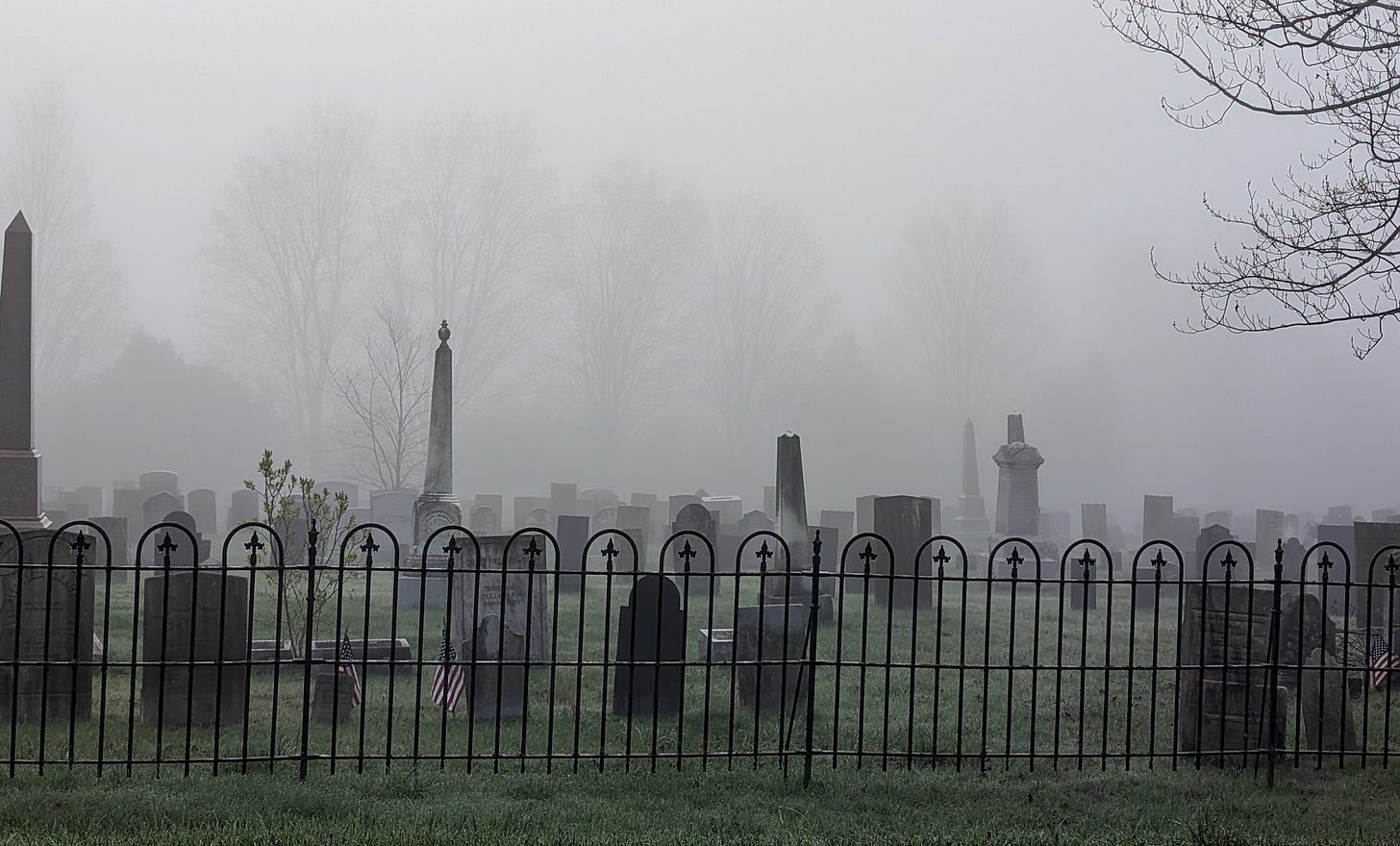Isaiah's Memorial Day
Spiritual tragedies, political faux-lutions, and hope in destruction
It is Memorial Day weekend, and I am off duty from preaching in my church. But it is Memorial Day weekend, the time when some of us look for the redeemable in war, when allegiances are pledged and tested again, and I remain on duty in town.
This Friday, our local K-12 school hosted a Memorial Day weekend event. As we crowd into the rows of folding chairs at half-court of the small gym, the school’s blue and white championship banners are stoic in the rafters above the hoops. A grandson of two veterans and the local pastor, I am one of the adults who have been asked to be here to honor those who can’t. With no expectations, I find myself enjoying the simple service. In between exhausting the catalog of patriotic songs and a choral rendition of the Vermont state anthem, the older teens take turns reading poetry, from Walt Whitman’s natural mysticism to Bruce Weigl’s commentary on Vietnam to original pieces.
Cynics would say that Memorial Day is just another symptom of American glorification of war. And our words about war on such days can be used to that end. But this weekend, that’s not how it feels to me. It feels more like we are working the foot pedal of a community sewing machine. It feels more like looking for redemption in inevitable human horror; the moments of sacrifice and grace, the opportunity to repent and forgive, to honor and remember the men and women whose one precious life was given for others’ lives. We are here in this gym not to name such things to glorify war, but to insist that there has been something sacred in times and places where God seemed most absent.
It is Memorial Day, and Isaiah keeps speaking.
In the year that King Uzziah died, I saw the Lord sitting on a throne, high and lofty; and the hem of his robe filled the temple.
Seraphs were in attendance above him; each had six wings: with two they covered their faces, and with two they covered their feet, and with two they flew.
And one called to another and said: “Holy, holy, holy is the LORD of hosts; the whole earth is full of his glory.”
The pivots on the thresholds shook at the voices of those who called, and the house filled with smoke.
Isaiah 6:1-4
“In the year that King Uzziah died,” writes Isaiah, framing the time around his glorious vision of the Almighty. Some commentators liken this context to referring to the year JFK was assassinated, or the War on Terror happening post-9/11.1
As described by Aaron and Marissa Burt,2 Uzziah begins as a good king, walking in the way of the Lord, a righteous warrior who fights justly against Judah’s enemies. In 2 Chronicles 26, the chronicler describes him as building the best kind of war machine, the strong army of God’s people with spiritual winds and ample political favor. But near the end of his fifty-year reign, he becomes arrogant in his strength, and it destroys him.
Despite not having ordination as a priest, Uzziah goes into the Lord’s sanctuary and burns incense on the altar. The priests confront him, telling him it is forbidden. This call for accountability angers Uzziah. In a moment of instant karma, he breaks out into leprosy. He spends his last days in quarantine away from the temple until his death.
This spiritual, religious, and political scandal thus rocked the kingdom. In defying spiritual law through outsized belief in his own authority, the heroic warrior king lost the very access to God’s glory to which he thought he was entitled.
Like post-9/11 America, Isaiah’s time had to be lived to be understood. Isaiah’s vision of God’s flowing robes descending from the sky into the temple with a heavenly soundtrack is a respite of hope in a long life of woe, wrath, and destruction. Perhaps, then, this moment for Isaiah comes at a time that is less like the swelling patriotism of post-9/11 and more like America’s awakening to the hubristic scandals of Iraq. Even many conservative defenders of the Bush administration had to eventually reckon with the war’s futility, a war that reopened wounds of Vietnam by repeating many of its mistakes and sins, returning many veterans home with feelings of governmental betrayal, tending to their spiritual and moral injuries on top of their physical wounds. As I saw during my stint as a chaplain intern in the Asheville VA hospital, Memorial Day and other recognitions are bittersweet at best for many of them. Their Appalachian, low-church faith would come to shape mine.
This is closer to Isaiah’s atmosphere, the setting of Isaiah’s critical and mournful patriotism, the vibe when Isaiah glimpsed hope beyond hope.
And it is in this midst that Isaiah warns, prophesies, and sees. He warns about the folly of our efforts to fix our spiritual shortcomings with more political solutions. He prophesies a future where nations are humbled by divine destructive violence. And somehow, he sees the hope of Israel.
Isaiah is not anti-political for the sake of being anti-political. Prophets served a political function in a theocratic monarchy, and Isaiah himself was part of multiple courts after Uzziah in the southern kingdom of Judah. He is not anarchic, but rather has optimism for a future governance of peace and justice, not only by a Davidic king and Messiah but by others below them (32:1-8, 16-20). And so he attempted to influence politics despite Uzziah proving not to appreciate spiritual sanction from his people. For Isaiah to speak of “woe to those who make unjust laws, to those who issue oppressive decrees, to deprive the poor of their rights, and withhold justice from the oppressed of my people” (10:1-2) is not just preaching, but a means of risky political involvement. He did this because he knew he had a higher authority to be accountable to.
But in a timbre more pessimistic than Ecclesiastes, Isaiah burns with mourning for the reality of the fallen politics around him. Mired in corruption, which is first and foremost spiritual rot, he presses the vanity of political band-aids. As the kingdom becomes increasingly endangered by its geopolitical rivals, Judah becomes more dependent on feeble alliances. But, as Isaiah tries to tell them, this will all be for nothing. They are attempting to avoid their fate with the same behavior that brought it to them, and all who are complicit (most of them, save a few) will share this fate. Fixing corruption with the next corrupt deal isn’t going to help when the corruption itself is an act of distrust in God.
For us Americans, this is not simply an object lesson for Washington and a scold on our professional politicians. This is vital for our daily lower-scale political corruptions that rule us. Many have noted the “epistemic crisis” we are in, where institutions feel less reliable in discovering truth than ever, for the truth has less cache than the favor. Below such institutions, whether in corrupt workplaces, subcultures, churches, organizations, or other social systems, too many of us find ourselves playing games that are more about pragmatism and less about righteousness in the best sense—from above, rather than from ourselves.
The disease of pragmatism was a favorite topic of 20th-century philosopher, sociologist, and occasional theologian Jacques Ellul. Ellul’s wheelhouse was unveiling our hidden impulse towards efficiency, the drive to do work more effectively, which feeds into the hidden costs of convenience with unknown tradeoffs until it’s too late. In a “Meditation on Inutility,” a post-script to The Politics of God and the Politics of Man, Ellul diagnoses our desire for things to be practical, arguing that none of our work is meaningfully effective in light of the power of God.3 In traversing the history of Old Testament kings as a model for our modern spiritual biographies, Ellul delves further into Ecclesiastical politics than Isaiah. The inevitability of divine will feels too much for whatever we do to matter.
But like the author of Ecclesiastes, Ellul keeps going into this meaninglessness until it bottoms out. Eventually, he reaches the other side and interrogates our desire to be productive:
We must fix our regard on another dimension of [all] these acts that kings and prophets had to perform. It is just because these acts were useless and did not carry with them their own goal and efficacy that they are on the one hand testimonies to grace and on the other an expression of freedom. To be controlled by utility and the pursuit of efficacy is to be subject to the strictest determination of the actual world. To want to attain results is necessarily not to be a witness to the free gift of God. If we are ready to be unworthy or unprofitable servants (although busy and active at the same time), then our works can truly redound to the glory of him who freely loved us first.
God loved us because he is love and not to get results. Our works are thus given a point of departure and they are not in pursuit of an objective. If we act, it is because God has loved us, because we have been saved, because God’s Spirit dwells in us, because we have received revelation, and not at all in order that we may be saved, or that others may be converted, or that society may become Christian or happy or just or affluent, or that we may overcome hunger or be good politicians. Elisha goes to anoint Hazael because he is ordered to do so and not so that Hazael may do good. In this way the freedom of our acts, released from worry about usefulness or efficacy, can be a parable of the freedom of the love of God; but not in any other way.
Perhaps we are stuck with politics as the ignoble pragmatism of “how things get done” in a complex world negotiating between oppositional worldviews. Perhaps politics is a reality of social dynamics in a fallen world. But there are places, spaces, and realms that seem to be beyond pragmatism and beyond politics. They must be cherished and protected (perhaps even if it takes politics). And perhaps the Church should resist its temptation to accomplish. Perhaps Christians should sometimes be about doing what doesn’t work as a bulwark against the tide of pragmatic idolatry. Perhaps this idolatry is what Isaiah was calling us to repent of.
In the end, Isaiah is less about scapegoating political leaders than calling a people before the chilling horror of the mirror. And yet, in the end after this end, he sees the hope of Israel.
After the gym portion of the service ends, I walk with the principal and other community members to the local cemetery with a horde of kids in tow. We start to sing “This Land is Your Land” to accompany our march, Woody Guthrie’s sarcastic response to “God Bless America.” Our voices drop out after we get to the socialist verses, not as an intentional political statement, but because nobody really knows those parts (if we know they exist at all).
Our assembly marches through the metal gate of this over three-hundred-year-old graveyard, walking past twenty or so rows of twenty or so graves. These cemeteries are everywhere in rural New England. While many larger cities sequester their dead to one or two locations, the hyper-local nature of the old North Country means that the memories of ancestors are kept in small patches of prime real estate. The hands who built each corner of each town lie close to their handiwork. On this day, these cemeteries are all dotted with small American flags by headstones to signify the service of the resting.
I switch places with the child-throng, who have now formed a semi-circle against the yard's edge. I take a few steps, about-face, and recite a modified Memorial Day blessing with my best preacher’s voice. Since it’s a school event in secular Vermont, I take out the Jesus references. I add a line to the original blessing’s litany of gratitudes to pray for innocent lives taken in the spiral of violence that called our loved ones into war, for it is they who become most victimized by our other-means politics. Such thoughts are often cut from Memorial Day prayers, and I edit out some more from my time working with Vietnam veterans. But it feels right to pray for those who were killed not only by our enemies, but for the innocent who may have been on the other end of our loved ones’ triggers, for the moral injuries accumulated by those who thought they went to serve only to come out feeling used, for the injuries of being hated upon return that my grandfathers never had to nurse from the culturally-celebrated wars in the Pacific and Korea.
Much to Woody Guthrie’s despair, I complete my appointed civic duty and lead in singing “God Bless America.” The kids lay a flower down wherever there’s a flag. I’m surprised to find myself tearing up for people I’ve never met.
It does not feel like war is being honored. It feels like holding communal life together in the tried and true ways. Forget changing the world; to do such things to keep your community going is a challenge enough.
And I said: “Woe is me! I am lost, for I am a man of unclean lips, and I live among a people of unclean lips; yet my eyes have seen the King, the Lord of hosts!”
Then one of the seraphs flew to me, holding a live coal that had been taken from the altar with a pair of tongs. The seraph touched my mouth with it and said: “Now that this has touched your lips, your guilt has departed and your sin is blotted out.”
Then I heard the voice of the Lord saying, “Whom shall I send, and who will go for us?”
And I said, “Here am I; send me!”
Isaiah 6:5-8
If you thought you’d wasted years of your life on a fruitless endeavor, you could be Isaiah. The prophet spent three years stark naked and barefoot to try and warn people,4 and it is only in the retrospect of sifting back through the rubble that people started to really get him.
There are no immediate happy endings for anyone, including him. But there are more than happy endings, but glimpses of true glory. And while his words do not avoid a dire national fate, it is his individual act of repenting that shows us how to respond to God when we find him in the madness: “Woe is me! I am lost, for I am a man of unclean lips, and I live among a people of unclean lips; yet my eyes have seen the King, the Lord of hosts!”
On Memorial Day, I remember the human cost of corrupt politics turning into catastrophic spiritual failures. I remember that the human inclination to politics and war is in me; I, too, am unclean. I am kept from being even more stained by blood because of those who died. I am kept from deeper moral injuries by those who fought in wars both long ago and too fresh, by those who gave their life in defense against an international enemy, and even by those who gave their life for our fallen politics. I do not believe their lives were in vain, for they were a gift of grace from God. I believe God was, and is, faithful to their souls even when we aren’t. And I believe that remembering all this is worth doing. For Isaiah gives many oracles of destruction, but his clearest vision is a glory who can only be known as God. And if we cannot see his presence, there is a child, whose very name means he is with us, born under the drumbeats of war.
Peter Lockhart: https://revplockhart.blogspot.com/2012/05/year-king-uzziah-died.html
At Home with the Lectionary podcast, Trinity Sunday, Year B: https://athomewiththelectionary.com/
H/t Ed Prideaux.
Technically speaking, “naked and barefoot” is “double-naked”






What a fascinating pairing! Well done. This is well written and communicates very effectively. I found the use of Isaiah in this manner thought-provoking. Thank you!
Good look at the overall failure of politicians to answer to the people or some higher power for selling out in self-interest.